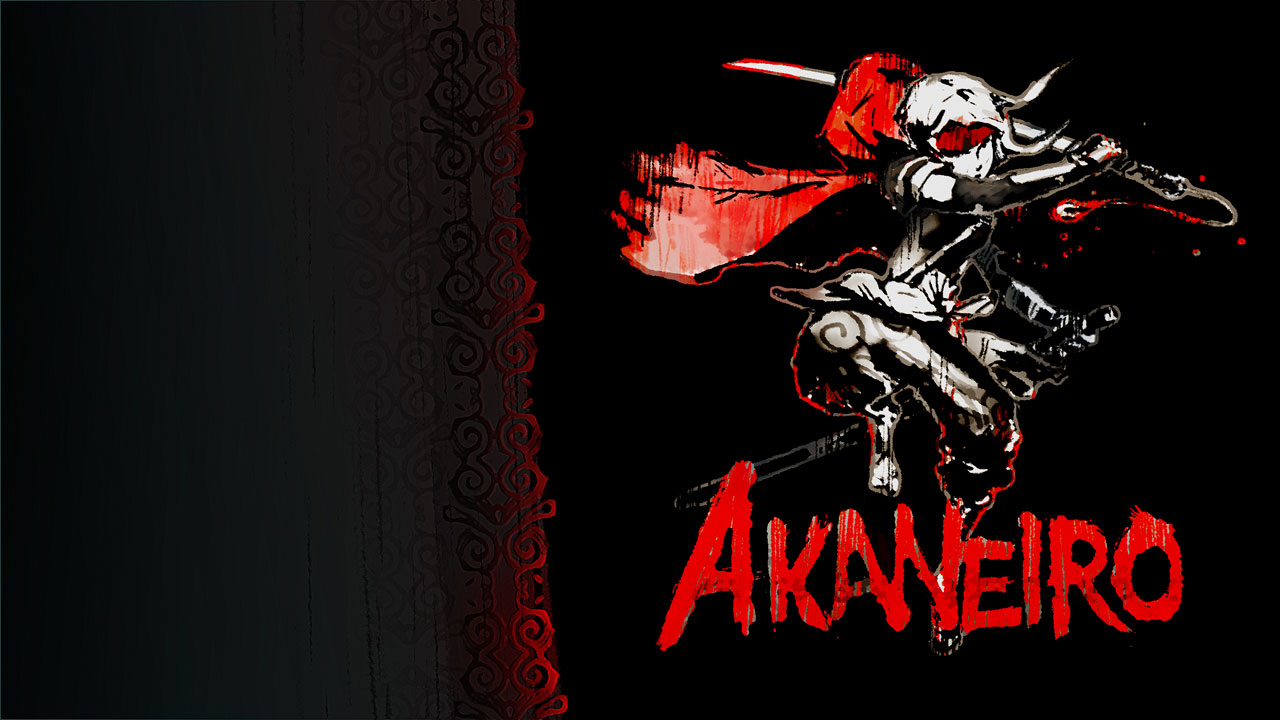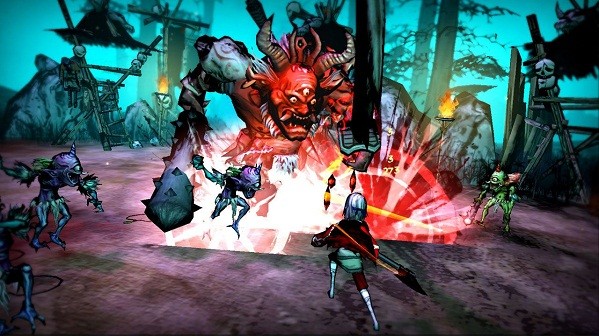American McGee has had as varied a career in gaming as any, helping to design levels on seminal shooters Doom and Quake, being the creative lead of the twisted yet whimsical Alice games, and leading development on the Grimm episodic series that originally released on GameTap. Now American has shifted focus to Akaneiro: Demon Hunters, a free-to-play title that adapts the Little Red Riding Hood fairytale set in the backdrop of Japanese legends and demons. As if that wasn’t enough, his development studio Spicy Horse has launched a Kickstarter for the game while it is a good ways into development (in fact, it’s already entered open beta). Even in Shanghai he’s an American original, and he was kind enough to answer some questions about Akaneiro.
Most game projects that are put up on Kickstarter are not even in early stages of production. What made you decide to put up Akaneiro on Kickstarter even though it’s well into development?
Because we’re weirdos and don’t like to do things like we’re supposed to! Breakfast buffet We go there for dinner! Kickstarter We turned it into Kicklauncher! Truth is, we’ve been thinking about using Kickstarter for quite a while, watching how other developers have approached it and taking notes on what’s been successful (or not). Throughout the learning process we realized that starting from scratch, especially on something where we don’t have an established track record (or other major questions might be raised about our approach), was a path to certain failure.
If I told you 18 months ago that Spicy Horse was going to shift from development on a console 3D platformer game (Alice: Madness Returns) to an ARPG delivered via the web (and mobile) and utilizing a F2P monetization model, you would have told me, “You can’t do that!” Without proof of our ability to deliver something so radically different from our previous work, a campaign like that would have crashed and burned quickly. By launching the game in the middle of the campaign we’ve been able to address that concern, plus benefit the project in a number of other ways like generating awareness and building solid connections with our audience.

That said, do you think the fact that having a real, working game to show off has benefited the Kickstarter?
American McGee: Absolutely! In fact, I think more developers should try this approach. If you’re able to get through 99 percent of development on your own and are then near launch, a Kickstarter campaign can be a real boost to awareness and engagement. It appears to work quite well with rewards being linked to in-game items as well. That aspect of it is something we’ve seen done very successfully here in China, where a big MMO might have a real-world auction of virtual items before the game is launched.
After all of your various experiences making games, what made you decide to go with a browser-based, free-to-play title this time?
Again, back to doing things differently for the sake of doing things differently. If I wanted to work on the same basic game over and over again, I would have stayed at EA. Nothing wrong with working at EA, they’ve got comfy chairs and the regular pay-checks are nice! Being independent means we can choose (within reason!) to pursue things people tell us we can’t or shouldn’t. Coming to China in the first place was like that. Building a studio in Shanghai was also met with a lot of, “You can’t do that!” It’s all about tackling new challenges and developing games we like to play.
Beyond that, my interest in the F2P, online model goes back to my first visits to China, nearly 10 years ago. I found hope in what I saw back then. The scene reminded me of how things were back before I even started in the industry . . . 20+ years ago. PC was king, swap meets were where you found the latest games and people socialized in real life around the games they were playing. That’s the only way it’s ever been here in China, and I figured moving here would be a good way to gain a better understanding of how the model might once again break us out of the retail-publisher choke hold.
What attracts you to doing “twisted” versions of children’s fables and fairy tales?
Actually, most of the tales I’ve worked with are pretty dark to start with. In some older versions of “Red Riding Hood,” for example, the wolf has rocks sewn into his belly and is then thrown into a deep river as punishment for attempting to eat Red and Granny. Even the Alice stories contain deep veins of dark material that most people ignore because they’ve only ever seen the Disney movie. My interest in these tales comes mainly from the fact that my own personal narrative style aligns nicely with the tone and presentation contained within them. It’s said that our personal narrative (or art) style is established when we’re young — and is often influenced by life between the ages of 6 and 12. For me, that was a time filled with diverse and often dark happenings. So this mode of storytelling just feels natural to me.
One thing that is obvious upon seeing Akaneiro is that it is stylistically unique, both visually and aurally. Do you feel that’s one of the game’s main appeals, along with its gameplay?
First impressions are critical regardless of the medium you’re working in — whether or not I sample new music on iTunes is largely decided by the cover art or band name. We’ve seen how dramatic this can be when comparing customer reactions between our first two F2P titles and Akaneiro. A lot of players just can’t seem to bring themselves to try something called “Crazy Fairies,” which features a goofy-cute logo and art style. The more hardcore the platform’s audience, the more extreme the reaction is. On Armor Games, which is largely casual, the game (Crazy Fairies) has been pretty well received. On Steam They’d firebomb it off of Greenlight if they could. Art style matters. Everything matters!

Akaneiro has a lot going for it — an interesting story, simple F2P model and wide range of platforms and devices on which it can (eventually) be played. Only time will tell if it establishes itself as a recognized brand-name in the ARPG space. Fingers crossed.
Do you feel the recently announced open beta will help seal with deal with some people who might be sitting on the fence for this Kickstarter?
It certainly hasn’t hurt. I cringe to think what I’d be doing right now if we hadn’t launched Open Beta at the start of the campaign. We had a lot of negative and misinformed press hit the wire along with the announcement of the Kickstarter campaign. If the game hadn’t immediately come out and squashed those vicious rumors . . . ouch. The worst part about someone taking the low road and slinging mud is that you’re damned if you attempt to defend yourself and damned if you don’t. We were lucky this time around, and next time I’m going to be a lot more cautious when it comes to how we present information to the media.
The support we’ve seen from Kickstarter has been incredible. What seems to push a lot of people off the fence are the new tiers and rewards we’ve been adding. I’ve taken the liberty of exploiting our Alice fans by enticing them with rare and collector item toys, posters, books and other merch. Works great — we get to clean our closet of things that were collecting dust and the fans get their “precious.”
Tell me about the Akaneiro comic and how it will expand on the game’s universe.
Dark Horse published a very successful “Art of Alice: Madness Returns” book, which went on to become so popular in Japan that localized versions had to be printed. From that success grew a relationship between our companies that continues to this day. Our hope is to present the audience with a way to engage the narrative in multiple places — and to provide bonuses to people who both read the comic and play the game.
Come check out what we’re up to at www.angry-red.com!

